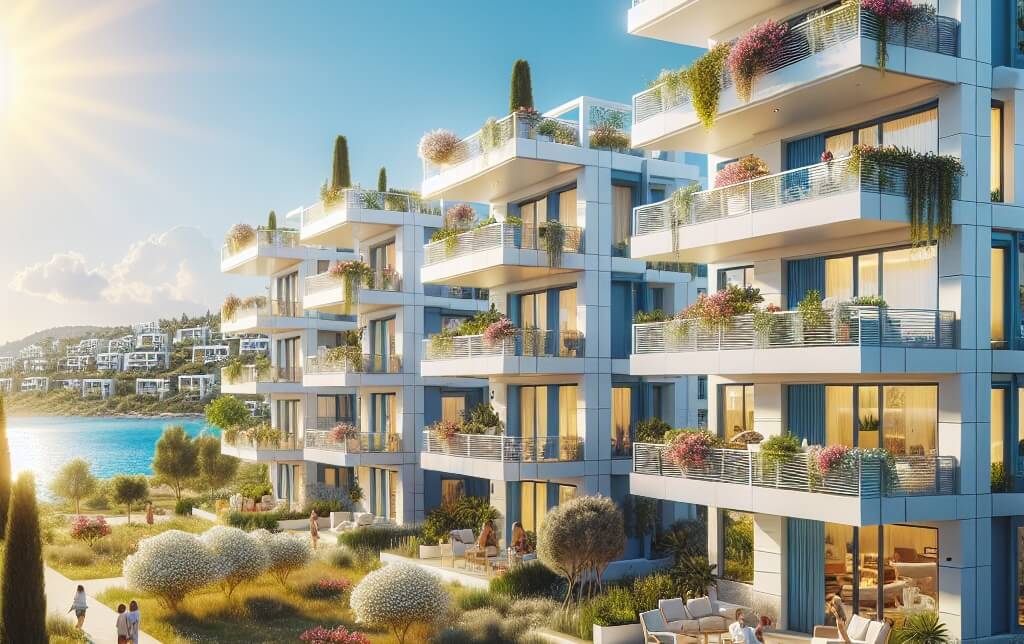
Step-by-Step Guide to Building Your Dream Home in Greece
To begin building your dream home in Greece, the first step is to acquire a suitable plot of land in a desirable location. This can be achieved by working with a reputable real estate agent who specializes in properties in Greece. Once the land is secured, it is essential to obtain the necessary permits and approvals from the local authorities. This includes obtaining a building permit and ensuring compliance with local zoning regulations. Next, it is crucial to hire a team of experienced architects and contractors who are familiar with the local building practices and can help bring your vision to life. Throughout the construction process, it is important to stay actively involved and communicate regularly with the construction team to ensure that your dream home is being built according to your specifications. Finally, upon completion of the construction, it is advisable to conduct a thorough inspection to ensure that the home meets all quality standards and regulations. By following this step-by-step guide, you can successfully build your dream home in Greece.
1. Introduction
The introduction of the construction project to build a house in Greece involves a comprehensive assessment of the location, resources, and requirements. Greece's unique architectural style, influenced by its rich history and Mediterranean climate, presents an opportunity to create a harmonious blend of modern amenities and traditional elements. Prior to the commencement of the project, a thorough analysis of the site's topography, soil composition, and local building regulations is essential to ensure a structurally sound and aesthetically pleasing design. Collaboration with local architects and contractors, as well as adherence to sustainable building practices, will be crucial in achieving a successful outcome that not only meets the client's needs but also respects the cultural and environmental context of the region.
2. Area Plot
An area plot is a graphical representation that can be particularly useful in the context of building a house in Greece. This type of plot displays the distribution of different land areas on a property, allowing for a clear visualization of how the available space can be utilized efficiently. By utilizing an area plot, one can effectively plan the layout of the house, outdoor spaces, and any additional structures on the property, taking into consideration factors such as sunlight exposure, wind direction, and aesthetic appeal. This detailed analysis provided by an area plot can aid in maximizing the functionality and overall design of the house, ensuring a well-planned and visually appealing construction project.
3. Land Plot
When considering the acquisition of a land plot for the purpose of building a house in Greece, it is essential to conduct thorough research and due diligence. Factors such as location, size, topography, and legal regulations must be carefully evaluated to ensure the suitability of the plot for construction. Additionally, proximity to amenities, transportation infrastructure, and potential for future development should be taken into consideration. Engaging with local authorities and seeking professional advice from real estate agents or legal experts can help navigate the complexities of land acquisition in Greece. Ultimately, selecting the right land plot is a critical step in the process of building a house that meets both your needs and regulatory requirements.
4. Building Permit
In order to commence the construction of a house in Greece, obtaining a building permit is a fundamental requirement. The building permit serves as official authorization from the local government, ensuring that the proposed construction complies with all relevant regulations and standards. It is imperative to submit a detailed set of architectural plans and specifications to the competent authorities for review and approval. The process of obtaining a building permit involves a thorough examination of the proposed project to ensure its compliance with zoning laws, building codes, and environmental regulations. Failure to obtain a building permit prior to commencing construction may result in legal penalties and the halting of the construction process. Therefore, it is essential to adhere to the necessary procedures and obtain the required permits to ensure a smooth and legally compliant construction process.
5. Construction Company
For the construction of a house in Greece, it is imperative to select a reputable construction company with expertise in building residential properties in the region. The chosen construction company should possess a thorough understanding of local building regulations and requirements, as well as have a proven track record of delivering high-quality construction projects on time and within budget. Additionally, it is essential to ensure that the construction company has a skilled team of professionals, including architects, engineers, and contractors, who can collaborate effectively to bring the project to successful completion. By engaging a reliable and experienced construction company, one can ensure a smooth and efficient construction process, resulting in a well-built and structurally sound house in Greece.
6. Plot Construction
In the context of constructing a house in Greece, the plot construction plays a crucial role in determining the overall success of the project. The selection and preparation of the plot must be meticulously planned to ensure the structural integrity and sustainability of the house. Factors such as the topography of the land, soil composition, and proximity to essential amenities must be carefully considered during the planning phase. Additionally, adherence to local building regulations and zoning laws is imperative to avoid any legal complications. By paying close attention to the details of plot construction, one can lay a solid foundation for the successful completion of a house in Greece.
7. Real Estate
In the context of building a house in Greece, the real estate market plays a crucial role in determining the feasibility and cost of such a project. When considering real estate in Greece, factors such as location, property size, and local regulations must be carefully evaluated to ensure a successful and compliant construction process. Additionally, working with reputable real estate agents or property developers can provide valuable insights and assistance in navigating the intricacies of the Greek real estate market. By conducting thorough research and due diligence in the realm of real estate, one can make informed decisions and effectively plan for the construction of a house in Greece.
8. Necessary Checks
In the process of building a house in Greece, it is imperative to conduct necessary checks to ensure compliance with local regulations and standards. These checks may include obtaining the required building permits from the local authorities, conducting soil tests to assess the stability of the land, and ensuring adherence to seismic building codes due to the region's susceptibility to earthquakes. Additionally, it is important to verify the availability of utilities such as water, electricity, and sewage connections to ensure the functionality of the property. By conducting these necessary checks diligently and thoroughly, one can mitigate potential risks and ensure the successful completion of the construction project in accordance with legal requirements and safety standards.
9. Cost of Building
The cost of building a house in greece can vary significantly depending on various factors such as location, size, materials used, and labor costs. Generally, the average cost per square meter for building a house in Greece ranges from €800 to €1,500. Additional expenses to consider include obtaining necessary permits, architectural and design fees, utility connections, and any landscaping or exterior features. It is advisable to consult with local construction professionals and obtain detailed quotes to accurately estimate the total cost of building a house in greece.
10. House Design
When considering house design for a project in Greece, it is essential to take into account the unique architectural styles and cultural elements of the region. Incorporating elements such as white-washed walls, flat roofs, and open-air spaces can help create a home that blends seamlessly with the surrounding environment. Additionally, utilizing materials such as stone and wood can add a rustic charm to the design while ensuring durability and sustainability. Attention should also be given to the orientation of the house to take advantage of natural light and ventilation, as well as to optimize energy efficiency. Overall, a thoughtful approach to house design in Greece should aim to harmonize modern comforts with traditional aesthetics to create a timeless and elegant dwelling.
11. Urban Development
Urban development in Greece plays a crucial role in the construction of residential properties, such as building a house. The process of urban development involves careful planning, adherence to zoning regulations, and consideration of environmental impact. In the context of building a house in Greece, it is essential to work with local authorities to obtain necessary permits and ensure compliance with building codes. Additionally, urban development in Greece aims to create sustainable and aesthetically pleasing neighborhoods that enhance the overall urban landscape. By following proper urban development practices, the construction of a house in Greece can contribute to the growth and prosperity of the local community while also preserving the natural beauty of the surrounding environment.
12. Archaeological Service
When considering the construction of a house in Greece, the utilization of an Archaeological Service is essential to ensure compliance with local regulations and preservation of historical artifacts. The Archaeological Service plays a crucial role in conducting surveys of the proposed building site to identify any potential archaeological remains or artifacts that may be present. In Greece, where the land is rich in history and ancient civilizations, it is imperative to conduct thorough assessments to protect and preserve the cultural heritage of the area. Engaging with the Archaeological Service not only satisfies legal requirements but also demonstrates a commitment to respecting and honoring the historical significance of the land on which the house will be built.
13. Energy Efficiency
In the context of building a house in Greece, energy efficiency plays a crucial role in ensuring sustainable and cost-effective living. Implementing energy-efficient measures such as proper insulation, energy-efficient appliances, and renewable energy sources can significantly reduce energy consumption and utility costs. By incorporating passive design strategies, such as orientation, shading, and natural ventilation, the house can maximize natural light and thermal comfort while minimizing the need for artificial heating and cooling. Additionally, investing in energy-efficient technologies like solar panels or heat pumps can further enhance the house's overall energy performance. Prioritizing energy efficiency in the construction of a house in Greece not only contributes to environmental conservation but also promotes long-term savings and comfort for the occupants.
14. Plot Boundary
In the context of building a house in Greece, understanding and respecting the plot boundary is crucial for complying with local regulations and ensuring a harmonious integration of the structure within its surroundings. The plot boundary delineates the limits of the land where the house will be constructed, serving as a legal demarcation that must be adhered to during the design and construction process. It is essential to accurately survey the plot boundary to avoid encroachment on neighboring properties and to maintain the aesthetic and structural integrity of the house within the designated area. Adhering to the plot boundary also facilitates proper land use planning and contributes to the overall urban development of the area.
15. Buying Land
When considering the purchase of land to build a house in Greece, several important factors must be taken into account. Firstly, it is crucial to conduct thorough research on the location, including the legal requirements and restrictions related to land ownership and construction in greece. This will ensure compliance with local regulations and prevent any potential issues in the future. Additionally, evaluating the accessibility, proximity to amenities, and potential for appreciation in value should also be considered. Engaging the services of a reputable real estate agent or legal advisor can provide valuable guidance throughout the process of buying land in greece. By carefully considering these factors, one can make an informed decision and successfully acquire the land needed to build a house in Greece.
16. Locating the Plot
When building a house in Greece, locating the plot is a crucial initial step in the construction process. The selection of the plot should take into consideration various factors such as the local climate, topography, and accessibility to utilities and services. Additionally, it is important to ensure that the chosen plot complies with local building regulations and zoning laws to avoid any legal issues in the future. Conducting a thorough assessment of the plot will help in determining the optimal placement of the house to maximize natural light, ventilation, and views. Ultimately, selecting the right plot is fundamental in creating a solid foundation for the successful construction of a house in Greece.
17. Square Meter Area
When considering the task of building a house in Greece, the measurement of 17 square meters for the area is a critical factor to address. This size of space can significantly impact the design and layout of the house, influencing the number of rooms, their size, and the overall functionality of the living space. It is essential to carefully plan and optimize the utilization of this area to ensure that the house meets the desired requirements and provides a comfortable living environment. Factors such as the orientation of the house, natural lighting, and ventilation must be carefully considered to make the most of the available square meter area. Additionally, adhering to local building regulations and standards is crucial to ensure the structural integrity and safety of the house.
18. Important Criteria
When considering important criteria for building a house in Greece, several key factors must be taken into account. Firstly, the location of the house is crucial, as Greece's climate varies significantly from region to region. Selecting a site that receives ample sunlight and is shielded from strong winds will ensure optimal living conditions. Additionally, the choice of materials is essential, with a focus on durability and resistance to the Mediterranean climate. Utilizing local materials such as stone and marble can enhance the aesthetic appeal of the house while ensuring its longevity. Lastly, adherence to local building regulations and cultural norms is imperative to seamlessly integrate the new construction into the surrounding environment. By carefully considering these criteria, one can create a harmonious and sustainable home in Greece.
19. Submitting Planning
Submitting planning for a construction project, such as building a house in Greece, is a crucial step in ensuring compliance with local regulations and obtaining the necessary approvals to proceed with the development. The process involves preparing detailed architectural plans, structural drawings, and other relevant documentation to be submitted to the appropriate authorities for review. It is imperative to adhere to the specific requirements and guidelines set forth by the local planning department to secure the necessary permits for construction. Additionally, engaging with professional architects and consultants can help navigate the complex planning process and ensure that the project meets all legal and regulatory standards. Ultimately, submitting planning is a fundamental aspect of the construction process that lays the foundation for a successful and compliant development project.
20. Building Agrotemahio
Building Agrotemahio, a house in Greece, is a task that requires careful planning, skilled labor, and adherence to local regulations. The construction process of Agrotemahio must consider the unique architectural styles and materials prevalent in Greece to ensure the house blends seamlessly with the surrounding environment. Additionally, attention to detail in the design and construction of Agrotemahio is essential to create a functional and aesthetically pleasing living space. Proper permits and permissions must be obtained to comply with local building codes and regulations. Overall, the process of building Agrotemahio demands a meticulous approach to ensure a successful and harmonious integration of the house into the Greek landscape.
21. Building Your Dream Home
When embarking on the journey of building your dream home in Greece, careful planning and consideration are essential. Begin by selecting a suitable location that aligns with your preferences and lifestyle, taking into account factors such as proximity to amenities, views, and accessibility. Engage with experienced architects and contractors who understand the local building regulations and can guide you through the design and construction process. Prioritize sustainable and energy-efficient features to enhance the comfort and longevity of your home. Remember to allocate a realistic budget and timeline for the project to ensure a smooth and successful build. By approaching the endeavor with diligence and a clear vision, you can transform your dream of owning a home in Greece into a reality that exceeds your expectations.









